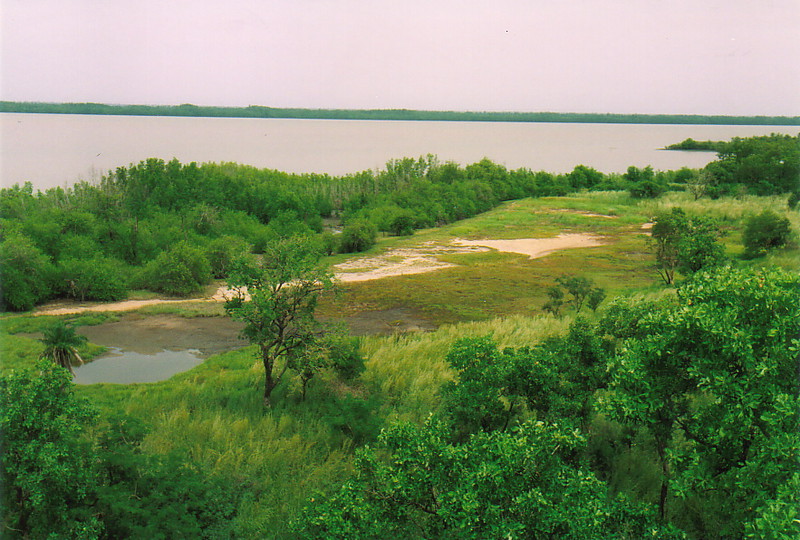
One of the things that amazes me about West Africa is how difficult things are for independent travellers. I didn't expect there to be any kind of backpacker infrastructure – this is the developing world, after all – but not only is getting around a pig, exploring the destinations can be a real pain too. The tourist industry here is aimed squarely at people taking tours, where companies run air-conditioned buses from the hotels to the tourist attractions and back again, but I prefer to explore on my own itinerary, if only because tours are rarely realistic for single travellers; they're often based on having four or six people, and if you don't have that many like-minded friends, the only way to take the tour is to pay for the empty seats yourself, and that's expensive.
Unfortunately it's really difficult doing it any other way, and sometimes you have no choice but to take a tour to see what you want to see. Kiang West National Park, a haven for ornithologists a few kilometres downstream from Tendaba, is one such place; the only way to get there if you don't have your own transport is to hop in a four-wheel-drive or pirogue, but even with two of us the price was steep. We asked about walking into the park, and it seemed that this didn't compute; all we got in the way of response was, 'It is much better if you are taking a guide, so you do not get lost.' Given the complete lack of maps of the area, we had no idea what to do.

Luckily this morning a safari was going out with three spare places, and after a bit of bartering the price came down an acceptable D150 per person, so after breakfast Chris and I hopped aboard a jeep with Sally from Sussex, Joan from Wales, Lamin (a boy from a local village whom Sally and Joan were taking out for the day), a driver, and our guide, the intriguingly named 'Wicked Wild', a nickname that he'd apparently got because of his penchant for partying.
The idea behind the safari was to track down some baboons in the National Park, but in the end what we got was a bumpy ride through the heart of the park to the River Gambia, a few minutes at a beautiful viewpoint over the river at an escarpment called Toubabkollon Point, and precious little else. The baboons proved elusive, but luckily there was far more amusement to be had in the company of strangers.
Sally and Joan fascinated me. Larger than life in more ways than one, they were prime examples of the British abroad. Sally got married just down the river from Tendaba (to a Gambian, I presume, but she never said), recently bought a house not far from Banjul, and spent her time flitting back and forth between the UK and the Gambia, working in England because there wasn't any work to be found in the Gambia; and Joan was a well-travelled hoot, and I smiled at the thought of her crammed on a Gambian bus, chatting to all the locals. I never worked out how Lamin fitted into the picture – he seemed completely bemused by the whole thing and didn't say a word through the whole trip – but going on safari with Joan and Sally was like going bush with the cast of Birds of a Feather.
'Ooh, this road's awful,' Sally would cry, as we hit another bump. 'They do live all primitive out here, don't they?'
'Gawd, I keep expectin' natives to jump out of the bushes,' Joan would pant, as we wandered through the bush on the way to another unsuccessful attempt to spot baboons. 'Have we much further to go, Wicked, ma boy?'
'Oh, look at little Lamby swatting those flies,' Sally would say. 'I hope he don't fall out of the back of the jeep. He don't 'alf give me the worries, that one.'
And so Sally and Joan piled on the Cockney and Welsh clichés as we bounded through the beautiful bush of Kiang West. We didn't find any baboons and only saw a few pelicans and birds, but I couldn't care less. Instead I was lucky enough to behold a couple of real British characters in the West African bush, and they were far more interesting than the native wildlife...